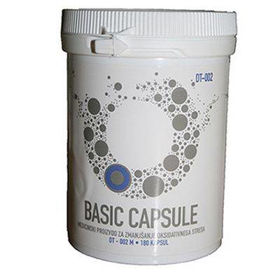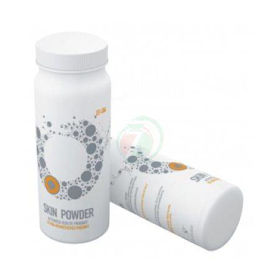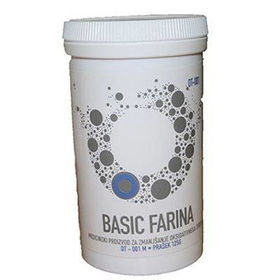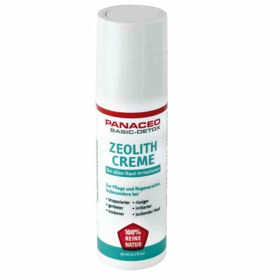Customer question:
What exactly is Zeolite, and what is it used for? Anonymous customer.
Pharmacist's answer:
Zeolite is a natural mineral of volcanic origin - it belongs to hydrated aluminosilicate minerals, which, in addition to minerals, also contain some alkaline earth metals. Over the past 200 years, approximately 40 natural zeolites have been identified. Still, not all are suitable for food use, including analcime, chabazite, clinoptilolite, erionite, ferrierite, heulandite, laumontite, mordenite, and phillipsite.
Natural Zeolite generally consists of an open, three-dimensional structure with an extensive network of open channels in micro view. Zeolite is a capable adsorbent thanks to the channels running through its structure. When the loosely bound, positively charged atoms (cations) travel through the channel, they remain bound in the negatively charged "honeycomb" structure of the Zeolite.
Zeolite is one of the few minerals that carry a natural negative charge. Zeolite is a widely used rock because it absorbs liquids and elements (heavy metals) based on the strength of the chemical bond, which is enabled by the combination of a "honeycomb" structure and a net negative charge. The element's attraction to Zeolite is also called ion-exchange capability, while the honeycomb structure is advantageously used as a molecular sieve for filtering other compounds.
Natural and synthetic zeolites are used as medical devices due to their unique adsorption, ion exchange, molecular sieve, and catalytic properties.
The most common categories for using natural Zeolite are pet bedding, animal feed, horticultural use (soil improvers and growing media), wastewater treatment purposes, and as a powerful adsorbent used for digestive tract detoxification. Synthetic zeolites' most common uses are catalysts, detergents, and molecular sieves.
Can Zeolite be used to purify the body? - question from an anonymous customer
Zeolite can adsorb and release water in an amount that reaches 30-50% of its weight. In addition to water, Zeolite can also adsorb other elements - hefty metals. Since Zeolite can adsorb many harmful chemicals and substances, it can be used to purify the body.
The strong negative charge of ions binds positively charged ions, such as pesticides, alcohols, benzenes, chloroform, heavy metals (lead, mercury, cadmium, aluminum, nickel, tin), free radicals, and radioactive metals.
In a clinical trial with 33 volunteers, Zeolite accelerated the elimination of aluminum, arsenic, lead, mercury, and other heavy metals. Laboratory analysis confirmed that the results are due to the body's detoxification.
Link to clinical trial: https://www.dovepress.com/clinical-evidence-supporting-the-use-of-an-activated-clinoptilolite-su-peer-reviewed-fulltext-article-NDS
In what forms can Zeolite be consumed? Which is the best? - question from an anonymous customer
We know natural and synthetic zeolites. Natural Zeolite is produced from natural volcanic rocks, while synthetic types are created from chemicals. The natural structure of Zeolite contains more acid-resistant silica, which binds its structure together.
Zeolite can be consumed mainly in powder, and this type of Zeolite consists mainly of dolomite and clinoptilolite.
What are the dosages for consuming Zeolite? Can side effects occur? - question from an anonymous customer
Regimes for taking general Zeolite, which you can buy from our pharmacy, are as follows:
- Inhibition of alcohol absorption: 5 g with liquid.
- Cleaning of the intestinal mucosa: 1.85 g daily, three months.
- Relief of gastroesophageal reflux disease (GERD) and stomach ulcers: 1.5 g daily for two weeks.
- Antioxidant support: 5.5 – 6 g daily, one month.
In clinical trials, Zeolite did not cause significant side effects. Because Zeolite binds heavy metals and other toxins, some have expressed concern about possible poisoning from contaminated zeolite residue. However, since Zeolite has a high affinity for these toxins, it keeps them trapped in its structure and is excreted as such.
It is necessary to know that not all zeolites are suitable for consumption; some are even toxic.
Erionit's type of natural fibrous Zeolite can cause cancer if inhaled, so only consume zeolites recommended by your pharmacy.
No study has confirmed the safety of Zeolite in children, pregnant women, and nursing mothers, so it is recommended to avoid consuming Zeolite in these cases.
Can Zeolite also be used in cosmetics? - anonymous customer question
Since it has been clinically proven that Zeolite also works against pathogens, bacteria, and microorganisms, it can also be used in skincare cosmetics. When activated with water, zeolite powder has smoothing, soothing and regenerative effects.
Interesting reading: Zeolite drops













